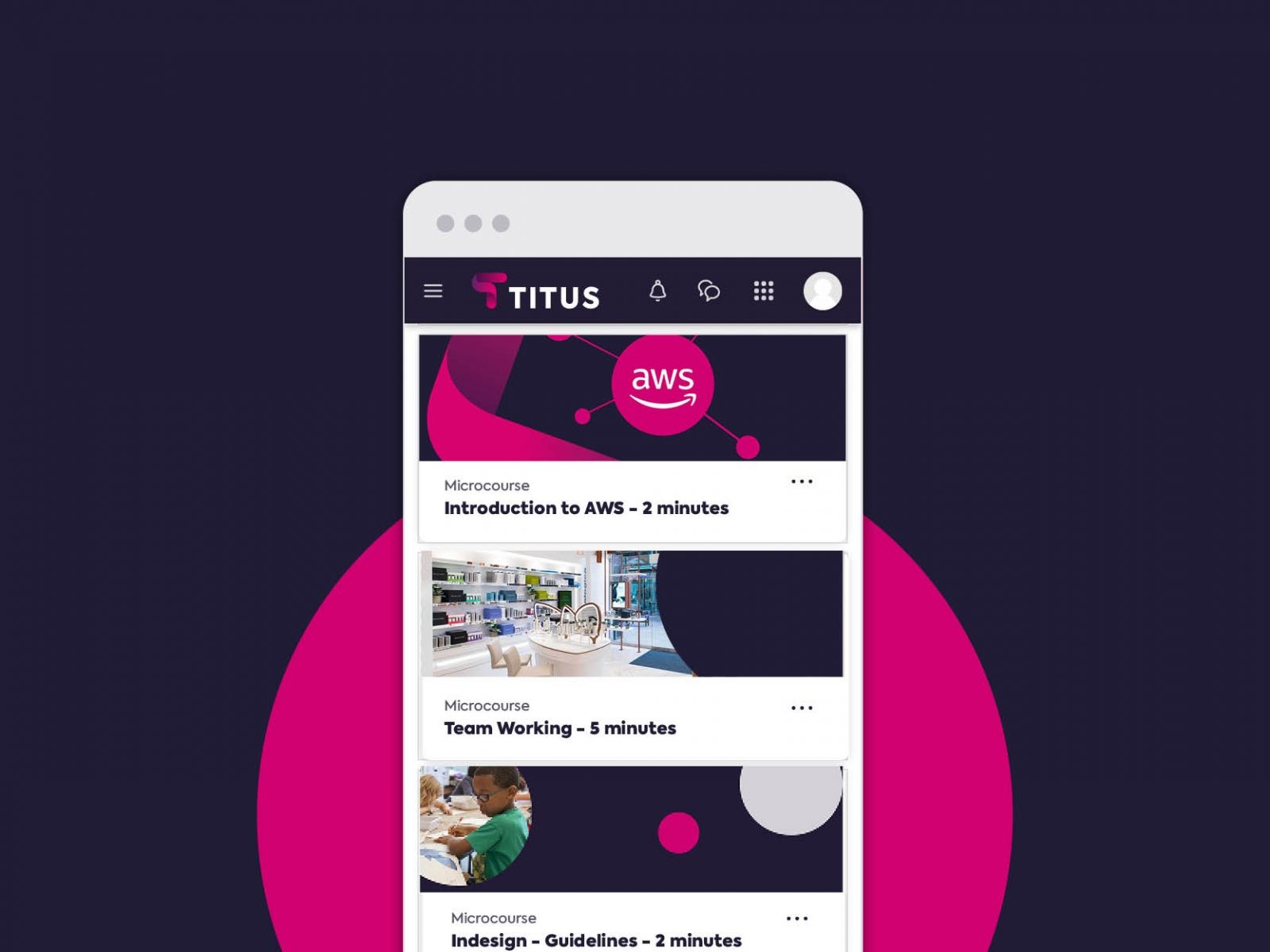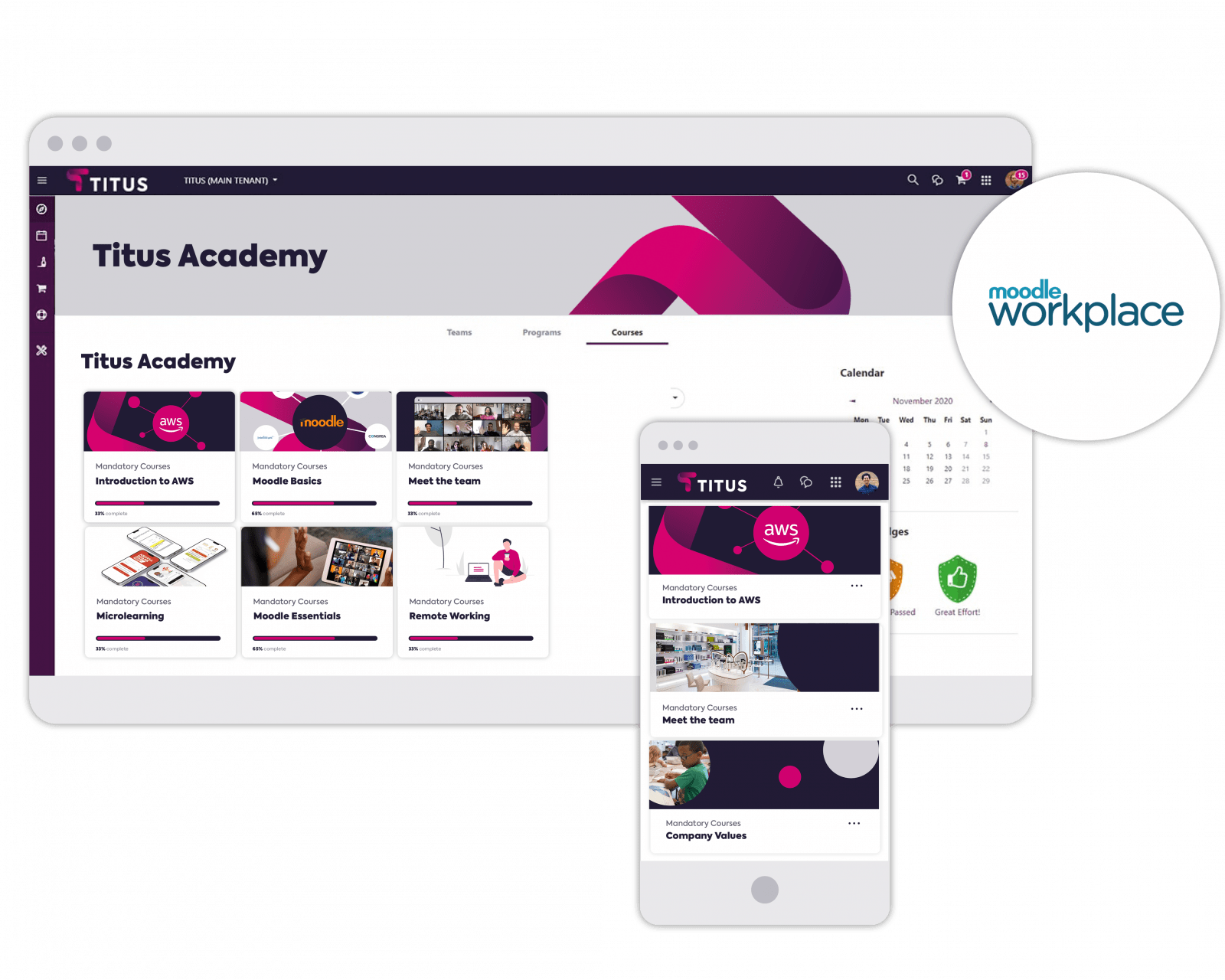- Home
- Our Solutions
Titus Services
Unlock Moodle's Potential with Titus
Migrate to Titus and transform how you use Moodle in your organisation. - Industries
- Our Work
- About
- Blog


In a new series of blog posts, we’re going to take a detailed look at how Moodle measures up against some of the other learning platforms available on the market.
Introducing… Blackboard
Blackboard is a well established educational technology company, best known for its popular learning platform, Blackboard Learn, which is used in thousands of educational institutions across the United States and worldwide. The company also offers a streamlined version of the LMS, Blackboard Learn Ultra, which is marketed towards business users.
Introducing… Moodle

Moodle has a similarly impressive pedigree, and like Blackboard, traces its roots to the education sector, with Moodle LMS being the most popular open-source learning platform in the world, used in thousands of schools and universities. More recently the company released Moodle Workplace, a new version of the platform with a feature set designed specifically for businesses.
Vendors
Blackboard Learn is available directly from Blackboard, with the company providing a range of complementary services, including onsite or remote training as well as technical support. Pricing is based on customer requirements, and the LMS is not offered via third parties.
In contrast, organisations wishing to implement Moodle Workplace can choose from a number of Moodle Certified Premium Partners (for example, Titus). Partners offer design, development, integration, hosting, support and training services, with pricing usually based on the specific mix of services required, number of users, and contract length.
From a consumer perspective, Moodle Workplace arguably offers greater flexibility, as organisations have the option to choose between several providers to find the best fit for their needs, and potentially change providers during the lifetime of the LMS, if needed.
Another option is to work with more than one Moodle Partner, for example, purchasing an LMS contract with one provider for hosting, support and training, but working with a second specialist provider to develop a custom integration or design a bespoke theme.
Moodle vs Blackboard: Similarities and differences

As you might expect, the two platforms have a significant amount of functionality in common, with standard features such as course creation, content hosting, online assessments and reporting available as standard.
The greatest difference between the two learning management systems is probably in their underlying philosophies. Moodle Workplace is based on—and remains closely linked to—the open-source Moodle LMS.
While Moodle Workplace™ itself is not offered as an open-source platform, it does benefit from its association with the global Moodle developer community, and from the many third-party plugins, often available free of charge, which have been created for Moodle LMS and are also compatible with the business-focused version.
In contrast, Blackboard is a purely commercial project, and the platform is closed-source, so all development is undertaken by the parent company. This means there’s less flexibility when it comes to developing new features, plugins or software integrations.
Customisation

A crucial factor for many businesses choosing the right LMS for their needs is the level of customisation available.
The ability to adapt the design and user interface of a learning platform to cater for the specific needs of users, or to match other systems used within the workplace is important, not only from an aesthetic perspective but also in reducing onboarding and training time and limiting support requests.
Both Moodle Workplace and Blackboard Learn offer a range of options for organisations wishing to customise the look and feel of their platform, as well as standard accessibility features such as high-contrast colour modes.
With Moodle Workplace, however, the scope for personalisation is greater, as the platform’s themes can not only be customised, but designed entirely from scratch if needed, allowing for a much tighter fit with brand guidelines or existing user interfaces.
Extensions and integrations

A major factor in how well e-learning can be implemented in the workplace is the availability of software integrations that allow a company’s LMS to share data with other business systems, such as HR software, central reporting tools, office or productivity suites and e-commerce or payment tools.
Blackboard, via its Apps program, allows partner companies to create plug-in integrations, including creative tools like Adobe Cloud or Canva, plagiarism detectors and safe exam browsers, and advanced reporting suites such as Intelliboard. This allows users to extend the functionality of the platform in a variety of ways.
Moodle Workplace offers a similar, if arguably more extensive, library of plugins, supporting integration out-of-the-box with commonly used tools such as Google Workspace/Office365, Intelliboard, communications tools such as Zoom and Teams and training-specific software like CoachView.
With Moodle, however, there’s also the ability for Partners to create custom integrations for less commonly used or in-house applications, allowing individual organisations to ensure that the LMS is tightly integrated with all of their current and legacy systems.
Best choice for the modern workplace?
In an educational setting, the differences between Moodle and Blackboard are less apparent – each is a mature system that has been developed and improved over time to address the needs of teachers and students.
In a workplace setting, however, it’s fair to say that Moodle’s offering pulls ahead of Blackboard when it comes to adapting the LMS to the specific requirements of business users.
Most organisations will find the advanced customisation and integration options available via Moodle Workplace represent a significant advantage when it comes to embedding an LMS within existing workflows and ensuring compatibility with other business-critical systems.
The lack of vendor lock-in with Moodle Workplace also gives added flexibility when planning support or maintenance spending over the longer term, allowing businesses to take advantage of a competitive marketplace of potential suppliers, and to pick or choose different Moodle Partners to supply individual services, based on their areas of expertise.
Whether you’re a seasoned Moodle user or a recent convert, the Moodle Workplace platform represents a significant leap forward in meeting the evolving needs of the workplace learning sector.
To take a detailed tour of the LMS, or to find out more about a specific feature, get in touch with one of our team.

Privacy Policy | Cookie Policy | Data Protection Policy | Equality, Diversity and Inclusion Policy
© 2023 Titus Learning LTD | Company Number 08799881 | VAT Number 1813 09027
Super talented, unflappable and very funny, Phuong supports the whole marketing team in her role as Digital Marketing Executive. Phuong holds a bachelor’s degree in Business Administration and recently completed a master’s degree in Management and Marketing. Originally from Hanoi in Vietnam, Phuong is now based in the UK and climatising brilliantly to our weather and food.
Phuong owns a food review Instagram page as travelling and food are her passion. She also has a cute little french bulldog.
Ellie was the first woman to join Titus and has paved the way for many more since then. After studying for a degree in Fashion and Marketing, Ellie was lucky to find herself at fashion weeks and photoshoots.
Now she’s switched from talk of the front row to front end design and has brought loads of transferable knowledge to Titus. Ellie has also found a real passion for tech, especially in the learning sector, helping clients create positive change for their organisations.
As one of the youngest people at Titus but at the same time one of the oldest serving members of the team, Callum has graced Titus with his broad smile and positive attitude for over 5 years now. As a key member of the marketing team, Callum works across all areas, both on and offline, to ensure that all Titus brands and communication are on point.
After missing out on the opportunity to go to University the first time around, management encouraged him to enrol in our course alongside his work. He is now studying to achieve his Level 6 Diploma in Professional Digital Marketing.
Always bringing innovation and new ideas, Dec studied a degree in Journalism but found his passion in digital marketing. Dec has also worked in marketing for one of the countries biggest retailers and within the property sector.
Outside work, Dec Co-founded a news publication where he collaborated with global brands like Uber, Amazon, BooHoo and countless SMEs.